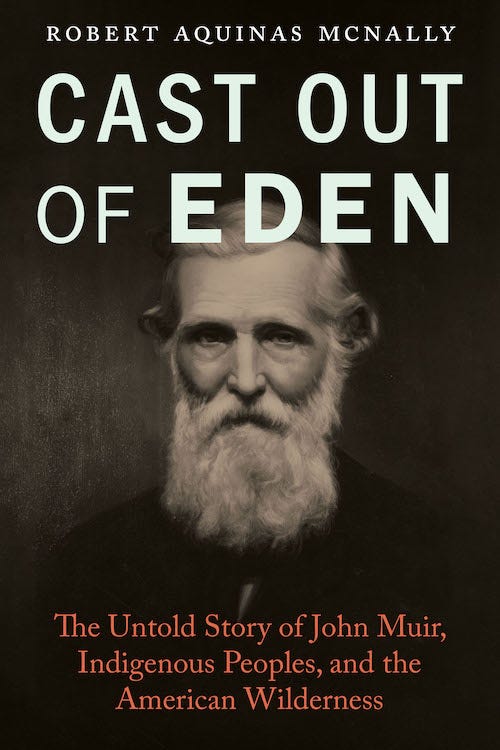Book Birthday: Shining a Light on a Secular Saint’s Shadow Side
This month CAST OUT OF EDEN, the book, turns one, a good time to look back to the project’s conception.
Right from the moment many years ago when I first encountered the figure of John Muir, something otherworldly, even sanctified, gathered in his being. Perhaps it was the photos of this father of the national parks peering into the Yosemite distance like a prophet beholding his god. Or his writings promising divine immanence in every walk in the woods. So when, in the course of researching The Modoc War (Bison Books, 2017), I found out that Muir had visited the battlefield only a year after the fighting ended, I had to dig deeper. A revelation awaited.
Unlike any other wild space before or after, California’s Lava Beds creeped Muir out. The cause of his discomfort was less the landscape itself than the warring Modocs’ hellish viciousness. He wrote later:
Though in battle they [Modocs] appear incapable of feeling any distinction between men and beasts, even their savageness lacks fulness and cordiality. The few that have come under my observation had something repellent in their aspects. Crawling stealthily in these gloomy caves, in and out on all fours, unkempt and begrimed and with the glare of war in their eyes, they must have looked very devilish.
A deeper dive revealed what had been hiding in the plain sight of Muir’s writings all along. But for the singular exception of Alaska’s Tlingits — whom he saw mistakenly not as Native Americans but as misplaced “Mongols” — Muir looked down his Scottish nose at all peoples of every tribal variety. “The worst thing about them is their uncleanliness,” he emphasized. “Nothing truly wild is unclean.”
Nor did Indigenous peoples belong in the wild spaces Muir sought to preserve as pristine national parks; their very presence polluted nature’s purity. “Somehow they seemed to to have no right place in the landscape,” Muir declared of a band of Kutzadika’as he encountered in the Sierra Nevada, “and I was glad to see them fading out of sight down the pass.”
“The American West began with war but concluded with parks.”
Muir hardly invented such disdain. Rather, he took popular thinking that cloaked white Anglo-Saxon Protestant supremacy in fake science and extended it to America’s wildest reaches. Muir’s gospel of wilderness purity helped ensure that tribes from Yosemite to Glacier, from Denali to Rainier, were driven from their homelands even as white tourists were invited in. As David Treuer (Ojibwe, Leech Lake) writes, “The American West began with war but concluded with parks.” Muir had a hand in tracing that tragic arc.
Up next: John Muir’s home land, and why it matters.
Birthday discount!
If you’d like a copy of Cast out of Eden at 40% off the cover price, order through Bison Books/University of Nebraska Press and use code 6AS24 on checkout. Should you want a copy autographed to you or someone else, you’ll find it on Matthew Kerns’s Dime Library. Either way, thanks!






